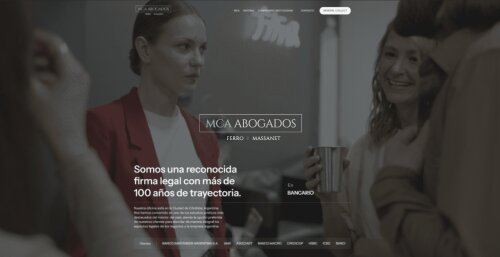Best Financial Services Regulation Lawyers in Córdoba
Share your needs with us, get contacted by law firms.
Free. Takes 2 min.
List of the best lawyers in Córdoba, Argentina
About Financial Services Regulation Law in Córdoba, Argentina
Financial services regulation in Argentina is primarily shaped by national laws and regulators, but provincial features matter in practice. National agencies - including the Central Bank of the Argentine Republic - Banco Central de la República Argentina (BCRA), the National Securities Commission - Comisión Nacional de Valores (CNV), the Superintendence of Insurance of the Nation - Superintendencia de Seguros de la Nación (SSN), the Financial Intelligence Unit - Unidad de Información Financiera (UIF), and the Federal Tax Authority - Administración Federal de Ingresos Públicos (AFIP) - set the core regulatory framework for banks, non-bank financial institutions, securities markets, insurance companies, anti-money laundering, and tax compliance.
In Córdoba province, provincial authorities and local market features influence how national rules are applied. Major local players - such as Banco de Córdoba - and provincial public procurement, tax and consumer-protection rules can affect contracts, licensing, and disputes. Financial services activity - including banking branches, fintech operations, insurance distribution and investment advisory - must comply with a mix of national standards and local administrative requirements. Compliance is also shaped by Argentina's evolving efforts on fintech regulation, customer protection, data privacy, and anti-money-laundering controls.
Why You May Need a Lawyer
Financial services law involves technical regulatory obligations, administrative processes and potential litigation. Common situations where legal help is valuable include:
- Licensing and registration - applying for authorization to operate a bank, financial entity, broker-dealer, payment service, or insurance intermediary.
- Regulatory compliance programs - designing and implementing know-your-customer, anti-money-laundering, consumer protection, and data protection procedures required by national regulators and provincial authorities.
- Enforcement and inspection responses - defending against regulatory inspections, administrative sanctions, fines or orders issued by BCRA, CNV, SSN, UIF or provincial inspectors.
- Contracts and commercial agreements - drafting and negotiating loan agreements, custody agreements, investment management contracts and distribution or agency contracts that comply with applicable rules.
- Consumer disputes and litigation - representing consumers or financial institutions in disputes over fees, product suitability, mis-selling, collection practices, foreclosures or local consumer-protection claims.
- Fintech and digital finance - advising on governance, technology risk, regulatory sandbox participation and cross-border payment issues as the regulatory environment evolves.
- Mergers, acquisitions and restructurings - navigating approvals and regulatory clearances required for transactions involving regulated entities.
- Tax and cross-border operations - coordinating tax compliance and reporting for financial transactions subject to AFIP rules and international obligations.
Local Laws Overview
Key legal components to consider in Córdoba include the following categories - with emphasis on the interaction between national regulation and provincial practice.
- Banking and financial entities - regulated principally by the BCRA and national financial statutes that set capital, liquidity, corporate governance and reporting obligations. Provincial implications include branch registration, local taxes and interaction with provincial public procurement rules when providing services to the province.
- Securities and capital markets - governed by CNV rules and national securities law. Brokers, advisers, public offerings and trading platforms must comply with disclosure, market conduct and licensing rules that can affect Córdoba-based issuers and intermediaries.
- Insurance - regulated by the SSN at the national level. Distribution, claims handling and local insurance intermediaries must satisfy national licensing and solvency requirements while also dealing with provincial consumer-protection standards.
- Anti-money-laundering and counter-terrorism financing - UIF rules require customer identification, suspicious transaction reporting and internal controls for a broad set of financial and non-financial activities. Reporting obligations are strictly enforced nationwide.
- Consumer protection - national consumer protection law applies across Argentina, and Córdoba has provincial institutions that handle local complaints and enforcement. Financial consumer rights include transparent information about fees, interest rates and contract terms.
- Data protection and privacy - financial entities must follow personal data protection standards when collecting and processing client information. National privacy rules are relevant, and sectoral guidelines may be issued by regulators.
- Tax and reporting - AFIP rules and reporting obligations affect transactional taxes, withholding, and reporting for cross-border transfers. Provincial tax rules in Córdoba can affect local operations and cost structures.
- Fintech and innovation - national regulators have issued evolving guidance and specific regimes for digital wallets, payment service providers and marketplaces. Local implementation and coordination with provincial authorities are common.
Frequently Asked Questions
Which regulators oversee financial services activities in Córdoba?
National regulators oversee most financial services: the BCRA for banking and payments, the CNV for securities, the SSN for insurance, the UIF for anti-money-laundering controls, and AFIP for tax matters. Córdoba provincial bodies - including the provincial Ministry of Finance, local consumer protection offices and municipal authorities - may have complementary roles, particularly for local registrations, consumer complaints and provincial taxation.
Do I need a provincial license to operate a financial business in Córdoba?
Most formal financial licenses come from national regulators. However, provincial registrations, local permits, tax registrations and municipal authorizations may be required for premises, commercial activity and local compliance. Always confirm both national licensing requirements and local administrative obligations.
How do I start a fintech or payment service in Córdoba?
Starting a fintech typically requires determining which national regulatory framework applies - banking, payment institutions, or securities - and then meeting licensing, capital and compliance requirements. You should prepare a detailed business plan, risk and compliance program, technology and cybersecurity controls, and AML procedures. Engage local counsel early to map national and provincial requirements and to interface with regulators.
What are common compliance requirements for financial firms?
Common obligations include capital and solvency requirements, periodic reporting to regulators, know-your-customer and AML controls, internal compliance functions, consumer disclosure and suitability assessments, data protection measures, and tax and accounting reporting. Specific obligations depend on the type of financial activity.
How do I respond to a regulatory inspection or enforcement action?
Respond promptly and in writing, gather and preserve requested documents, and consult a lawyer before submitting formal responses. Legal counsel can help craft the response, negotiate deadlines, request clarifications, and represent you in hearings or settlement discussions. Avoid informal admissions and preserve privilege where appropriate.
What rights do consumers have when a financial product causes losses?
Consumers have rights to clear information, transparent pricing, and fair treatment under national consumer-protection law. If a product was mis-sold, if disclosures were inadequate, or if unfair contract terms were used, consumers can file complaints with provincial consumer-protection offices, seek mediation, or pursue judicial remedies. Remedies may include refunds, contract adjustments, or damages depending on the facts.
What anti-money-laundering obligations apply to local businesses?
Entities subject to AML rules must implement customer identification, transaction monitoring, suspicious transaction reporting to the UIF, and internal controls. Many financial and non-financial businesses in Córdoba are covered. Penalties for non-compliance can be significant, including fines and criminal referrals.
How are disputes with banks or financial institutions resolved?
Disputes can be handled through internal complaint procedures, provincial consumer-protection agencies, administrative remedies before national regulators, mediation services, or civil courts. The appropriate forum depends on the subject matter - consumer issues often go to consumer offices or civil courts, while licensing and conduct issues go to national regulators.
Can foreign businesses provide financial services in Córdoba?
Foreign entities can operate in Argentina but must comply with national licensing, incorporation and registration requirements. Some activities require a locally incorporated entity or local representative. Tax, exchange control and reporting obligations also apply. Cross-border services may trigger additional regulatory scrutiny.
How much does it cost and how long does it take to resolve regulatory matters?
Costs and timelines vary widely - from relatively quick administrative registrations that take weeks, to complex licensing or enforcement matters that may take months or years. Legal fees depend on the scope, the need for technical experts, and whether litigation or complex negotiations are necessary. Early legal advice can reduce surprises and manage timelines and costs more effectively.
Additional Resources
For reliable and up-to-date information, consider the following institutions and bodies - they provide rules, guidelines and points of contact relevant to financial services in Córdoba:
- Banco Central de la República Argentina - BCRA
- Comisión Nacional de Valores - CNV
- Superintendencia de Seguros de la Nación - SSN
- Unidad de Información Financiera - UIF
- Administración Federal de Ingresos Públicos - AFIP
- Banco de Córdoba - provincial banking institution with local relevance
- Ministerio de Finanzas de la Provincia de Córdoba
- Provincial consumer-protection office or Defensoría del Pueblo de la Provincia de Córdoba
- Local chambers of commerce and industry associations that represent banks, fintech companies and insurance intermediaries
- Professional associations for lawyers and accountants in Córdoba that can recommend experienced advisors
Next Steps
If you need legal assistance in financial services regulation in Córdoba, follow these practical steps:
- Define the issue clearly - licensing, compliance, dispute, consumer complaint, enforcement or transaction. Prepare a short summary and timeline of events.
- Gather documents - registration papers, contracts, regulatory correspondence, internal policies, transaction records and any notices received from authorities.
- Seek a lawyer with experience in financial regulatory matters in Argentina and local knowledge of Córdoba. Ask about their experience with the relevant regulator, past cases and typical outcomes.
- Discuss scope and fees - agree on an engagement letter that sets out services, fees, disbursements and expected milestones. Consider whether fixed fees, hourly rates, or staged retainers make sense for your matter.
- Act promptly on regulatory deadlines - missed response dates can lead to fines or escalations. Your lawyer can request extensions if needed while preparing your response.
- Maintain compliance and document improvements - if you are operating a financial service, use advice to update compliance programs, staff training and record-keeping to reduce future risks.
- Use alternative dispute resolution where appropriate - mediation or negotiated settlements can save time and cost compared with protracted litigation or administrative appeals.
If you want, provide a brief summary of your situation and the documents you have, and I can suggest the types of specialists to contact and the key questions to ask prospective lawyers in Córdoba.
Lawzana helps you find the best lawyers and law firms in Córdoba through a curated and pre-screened list of qualified legal professionals. Our platform offers rankings and detailed profiles of attorneys and law firms, allowing you to compare based on practice areas, including Financial Services Regulation, experience, and client feedback.
Each profile includes a description of the firm's areas of practice, client reviews, team members and partners, year of establishment, spoken languages, office locations, contact information, social media presence, and any published articles or resources. Most firms on our platform speak English and are experienced in both local and international legal matters.
Get a quote from top-rated law firms in Córdoba, Argentina — quickly, securely, and without unnecessary hassle.
Disclaimer:
The information provided on this page is for general informational purposes only and does not constitute legal advice. While we strive to ensure the accuracy and relevance of the content, legal information may change over time, and interpretations of the law can vary. You should always consult with a qualified legal professional for advice specific to your situation.
We disclaim all liability for actions taken or not taken based on the content of this page. If you believe any information is incorrect or outdated, please contact us, and we will review and update it where appropriate.









